This article is the second part of a "deep dive" series on Hot Module Replacement with webpack.
module.hot API
In the first blog post of the HMR series, we discussed the four stages of the Hot Module Replacement process.
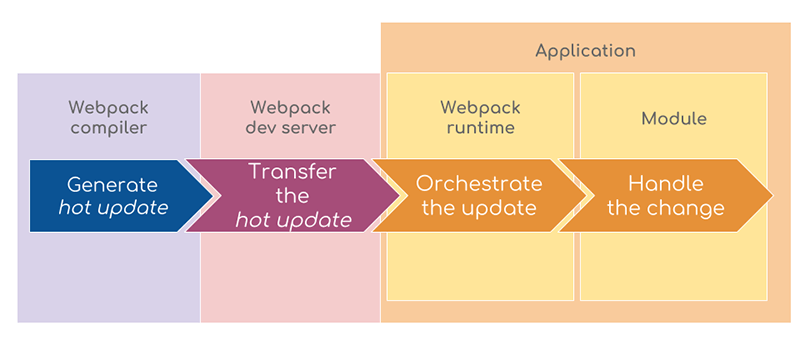
Today, we will focus on the last stage. We will learn how to instruct the modules in our application to refresh themselves when they receive a hot update.
The hot update handlers can either be injected by a webpack loader during the build, or be manually added by you. We will discuss only the second way in this article. Webpack exposes a public interface from the module.hot object. Let's explore it!
For our demos, we'll tinker with a simple webpage. It's best if you clone the project and follow the instructions, but it's not mandatory. You could also just read the blog post and trust me that everything works.
Clone the repository from https://github.com/sis0k0/christmas-tree. If you're a fan of the command-line interface, execute:
git clone https://github.com/sis0k0/christmas-tree.git
Navigate to the cloned folder and install the dependencies:
cd christmas-tree
npm install
To run the development server, execute:
npm run watch
After the build finishes, a new tab in your browser will open. Toggle the devtools console.
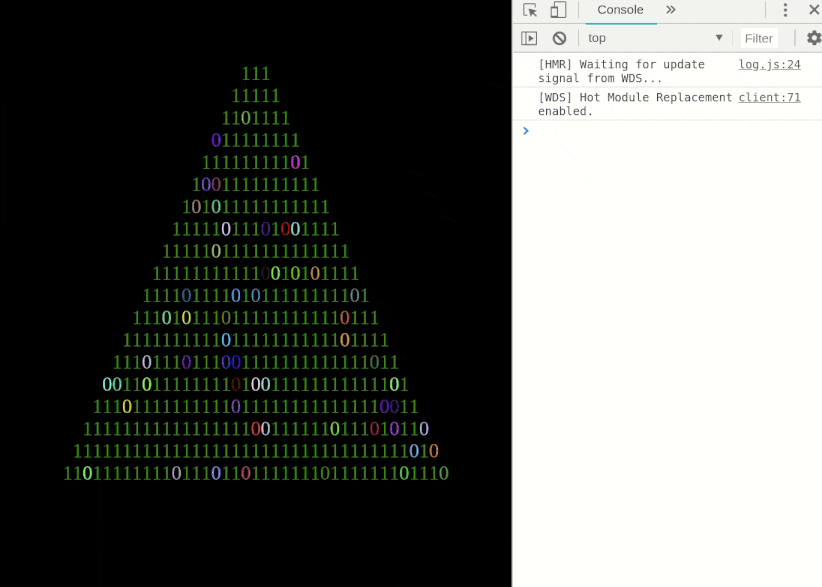
Merry Christmas! Yeah, I know it's February. But you haven't put down your Christmas decorations either, have you?
I would like you to notice two things here:
npm run watch starts the webpack development server, provided by the webpack-dev-server package.The image below shows the project structure (excluding node_modules):
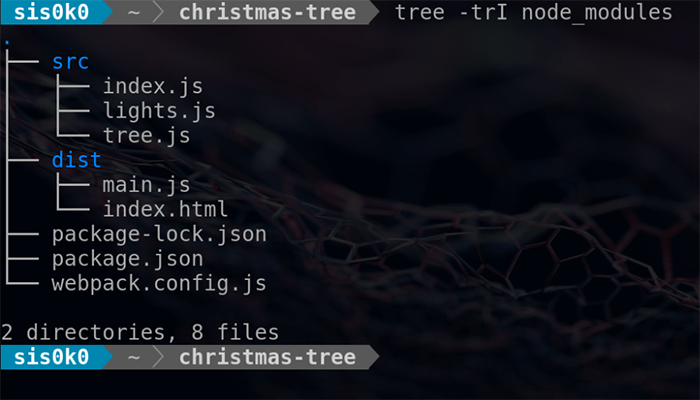
The source directory is where we will be making changes:
index.js imports all source files. That's the entry module for webpack;lights.js creates the blinking effect for the Christmas tree;tree.js draws the tree itself.The dist directory hosts the ready-to-run application.
main.js is the single output bundle, produced by webpack;index.html is the web page that loads main.js.We won't discuss package.json and package-lock.json in this post. If you want to learn more about them, check out the npm docs.
And finally, webpack.config.js - the place where we instruct webpack how to bundle our application. The application runs with HMR because the Hot Module Replacement plugin is part of the configuration:
const path = require('path');
const webpack = require('webpack');
module.exports = (env, argv) => {
const config = {
entry: './src/index.js',
output: {
filename: 'main.js',
path: path.resolve(__dirname, 'dist')
},
devServer: {
contentBase: './dist',
hot: true,
},
plugins: [],
};
if (argv.mode === 'development') {
config.plugins.push(
new webpack.HotModuleReplacementPlugin()
);
}
return config;
};
Enough theory, let's go back to the browser. The devtools console says that hot module replacement is running. But does it really work? 🤔
Open src/tree.js and increase the value of rowsCount.
We get a bigger tree, but also a full page reload. It can be hard to notice it. Look at the messages in the console - they disappear when the reload starts. When the scripts on the page are executed anew, the messages appear again. The goal of HMR is to avoid full page reloads.
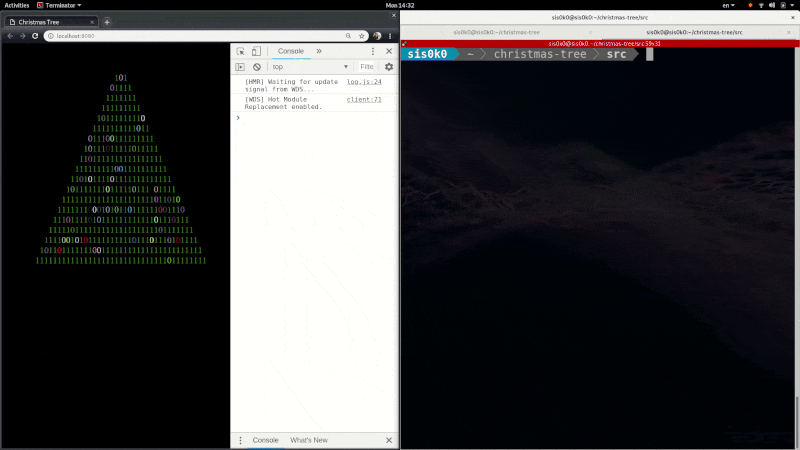
Currently, the application doesn't accept hot updates, because we haven't instructed it to do so. Therefore, the webpack-dev-server falls back to a full page reload.
The easiest way to handle an incoming update is by self-accepting it from the changed module. This will cause webpack to execute the new version of the module. All we need to add is:
src/tree.js
module.hot.accept();
However, the module.hot property is defined only when HMR is enabled. If we build the application for production, without HMR, the above code will throw an error. We need a check:
src/tree.js
if (module.hot) {
module.hot.accept();
}
One final note before trying it out - when we build for production, webpack knows that module.hot is undefined and the code block, guarded by the if statement, will never be executed. The UglifyJS/Terser plugin for webpack will remove it from the bundle. We don't have to worry that our development settings will end up in production.
Let's change the rowsCount again and see what happens. The page is not fully reloaded, but the tree still updates, because the new tree.js module is executed.
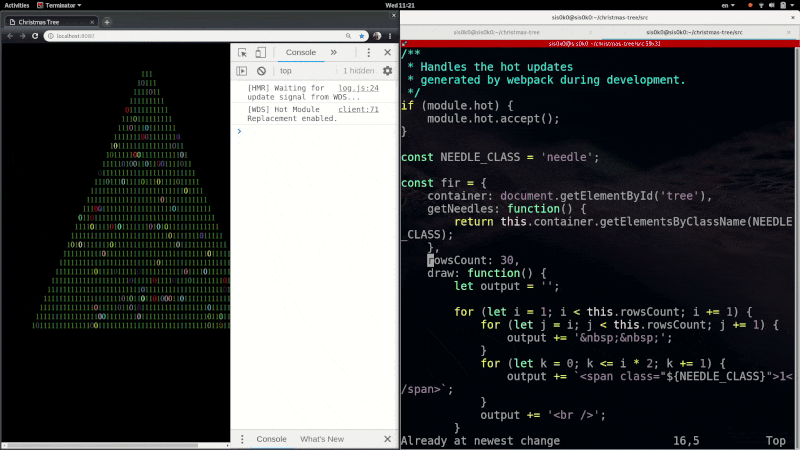
There's one more module in our simple app - src/lights.js, which "illuminates" the tree.
src/lights.js
import fir from './tree.js';
/**
* Changes the look of
* some 'needles' in the tree
* every 1000ms
*/
function turnOn() {
const blinkRate = 1000;
const rowsCount = fir.rowsCount;
const needles = fir.getNeedles();
setInterval(() =>
blink(rowsCount, needles),
blinkRate
);
}
turnOn();
// ...
To make lights.js a self-accepted module, we need to extend it with the same code that we used for tree.js earlier:
if (module.hot) {
module.hot.accept();
}
Now, let's try decreasing the blinkRate to make the lights go faster and increasing it for the opposite effect.
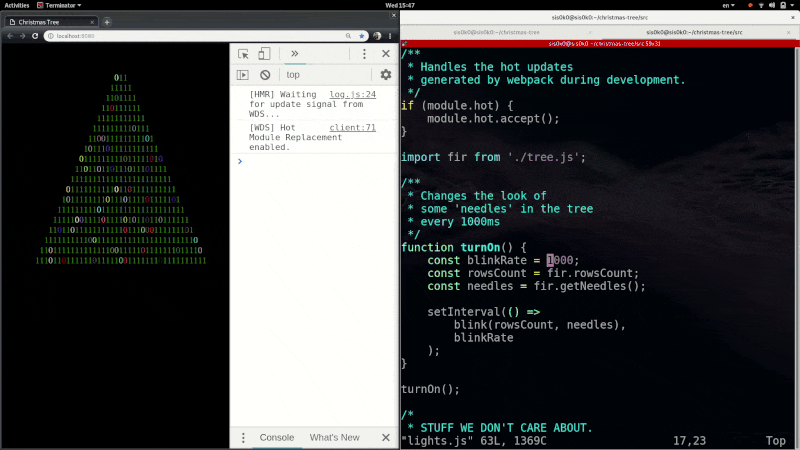
We didn't quite get the behavior we wanted. The light bulbs become more and more with every change. The self-accept causes webpack to execute the module whenever a hot update is needed.
src/lights.js
function turnOn() {
...
setInterval(() =>
blink(rowsCount, needles),
blinkRate
);
}
turnOn(); // <-- gets called every time the module is changed
Executing the code above has a side effect - it triggers a repeating action with the setInterval call. We never cancel the already started actions, but keep triggering new ones. Luckily, webpack provides a mechanism for disposing old modules before replacing them.
First, we need to keep the ID of the started action:
src/lights.js
let lightsInterval;
function turnOn() {
...
lightsInterval = setInterval(() =>
blink(rowsCount, needles),
blinkRate
);
}
Then, we can clear it before the new module is executed:
src/lights.js
if (module.hot) {
module.hot.accept();
module.hot.dispose(_data => {
clearInterval(lightsInterval);
});
}
And finally, we can try changing the blinkRate again:
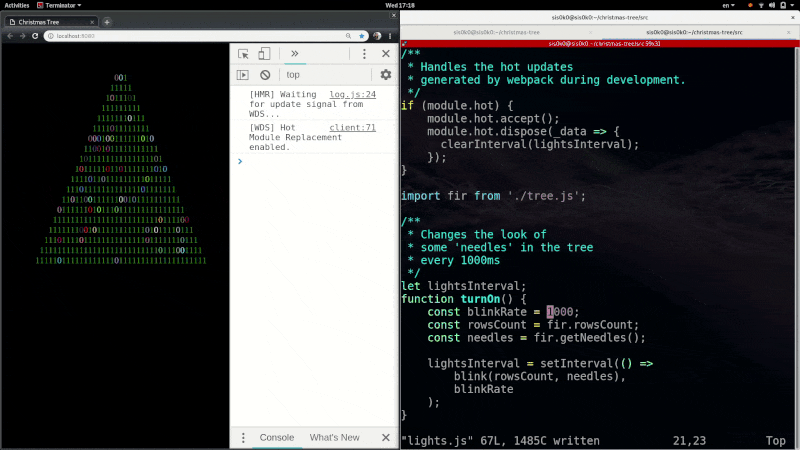
So far, we instructed webpack to execute the tree.js and lights.js modules whenever we change their code. The hot module replacement seems to work surprisingly well when the changed data is internal. But, what would happen if instead, we modify the public interface of a module? What would happen to the other modules depending on that interface 😱?
The tree.js module exports a single object - fir:
fir.draw() function visualizes the tree inside a container DOM element. It replaces the contents of the container with span elements needles. Each needle gets a className equal to the value of the NEEDLE_CLASS constant;fir.getNeedles() function returns all DOM elements with the above className.The lights.js module imports tree.js and uses fir.getNeedles() to obtain a list of the newly drawn DOM elements. The list is critically important for illuminating the Christmas tree. This is what the dependency graph looks like:

Let's put the HMR process to the test by modifying the value of NEEDLE_CLASS in tree.js.
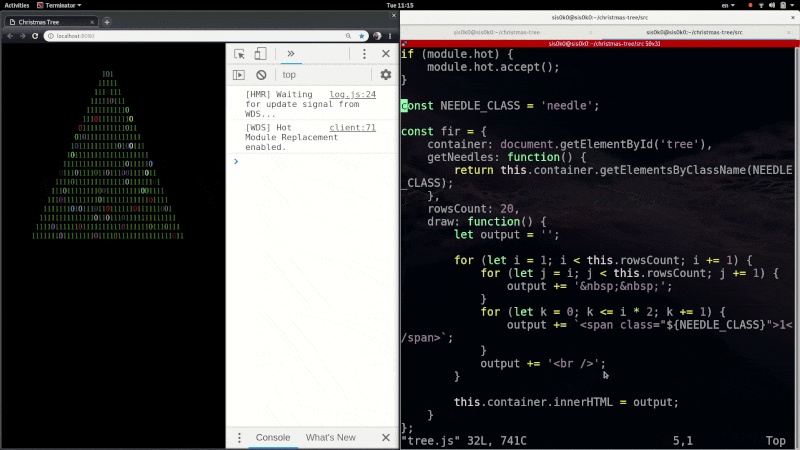
Our lights went out! The HMR process failed the test miserably.
Webpack executed tree.js when we changed it. The fir.draw() function created brand-new needles with classNames matching the new value of NEEDLE_CLASS. It also got rid of the previous needles.
However, nothing happened in lights.js. Its list of needles still references the old, already removed needles. We should refresh that list when tree.js is changed.
The parent accept API allows us to handle hot updates for a module from other modules that import it. We can extend the HMR logic in lights.js to restart the bulbs whenever tree.js is changed:
src/lights.js
if (module.hot) {
module.hot.accept(['./tree.js'], function() {
clearInterval(lightsInterval);
turnOn();
});
...
}
Now we have update handling logic for tree.js in two places:
lights.js;tree.js module itself.But which one will be preferred?
Let's visualize all possible update handling scenarios for tree.js:
If there is a self accept in tree.js, webpack executes the module. The modules that import tree.js (its "parents") are not notified of the change.
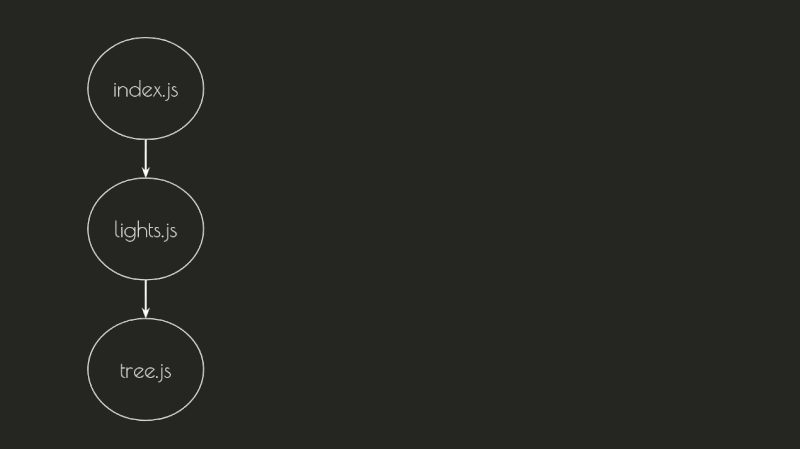
If there is no self accept in tree.js, webpack looks for update handlers inside the modules that import it.
The lights.js module imports tree.js. Let's say that it has a handler for it:
module.hot.accept(['./tree.js'], function updateHandler() {
...
});
Webpack will:
tree.js;tree.js import inside lights.js to point to the new module;updateHandler().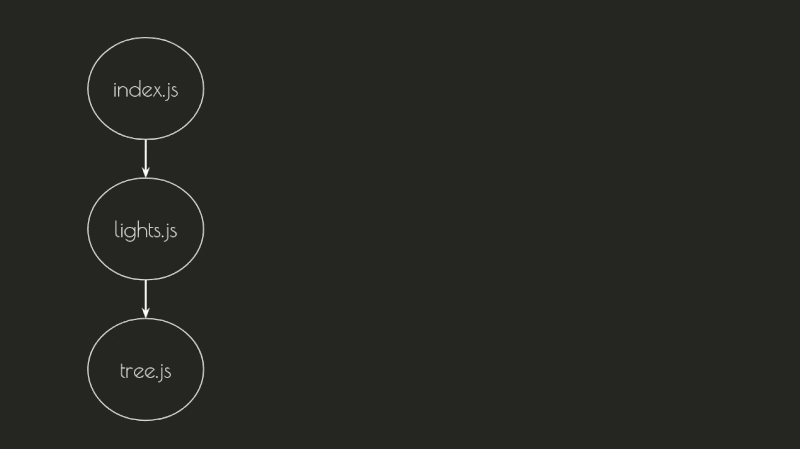
If there is no handler for tree.js in lights.js, webpack will continue looking up the dependency graph.
The index.js module imports lights.js. Webpack will check if it contains a handler for lights.js. I want to highlight this part - it won't check for a handler for tree.js (the changed module), but for lights.js (the module it actually imports). Let's imagine for a moment that index.js has a handler:
src/index.js
module.hot.accept(['./lights.js'], function updateHandler() {
...
}
Webpack will:
tree.js;lights.js (the imported tree.js module is updated)lights.js inside index.js;updateHandler().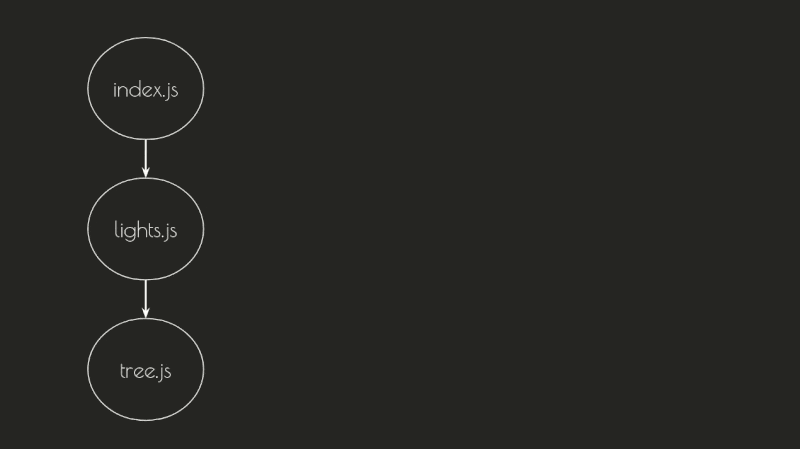
Webpack continues looking for handlers until it finds a 'root' module - a module, that's not imported in any other module. In that case, the webpack-dev-server will fallback to a full page reload, and in the case of NativeScript - an app restart.
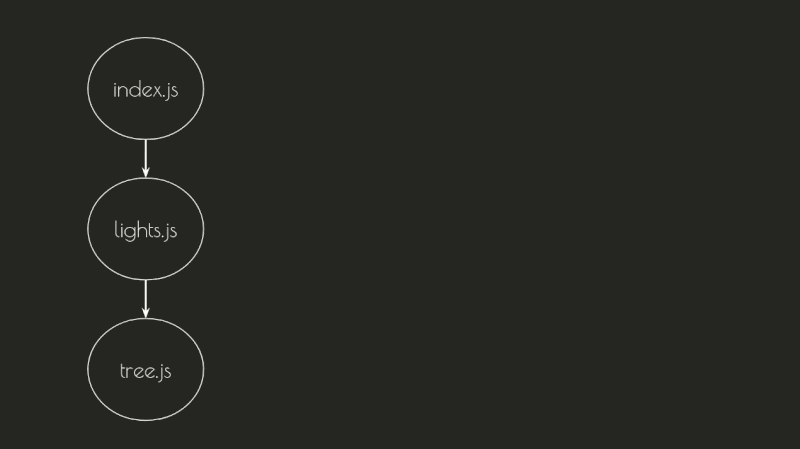
Back to the tree - we noticed that there are two update handlers for tree.js. We want webpack to use the new logic in lights.js. That's why we have to remove the self accept from tree.js.
src/tree.js
// comment or simply delete the code below
// if (module.hot) {
// module.hot.accept();
// }
Let's try changing the value of NEEDLE_CLASS again:
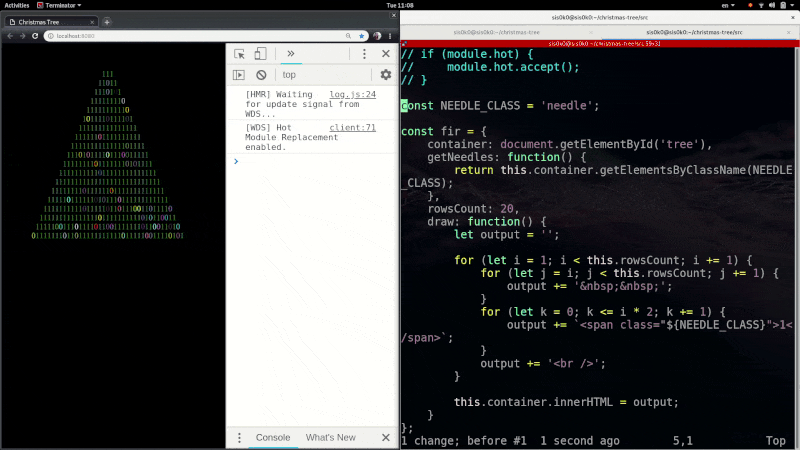
Aaaand...the HMR process fails. Instead of a refresh, we get a full page reload.
I must admit that I lied to you. The tree.js module is actually imported not only in lights.js but also in index.js. This is the real dependency graph:
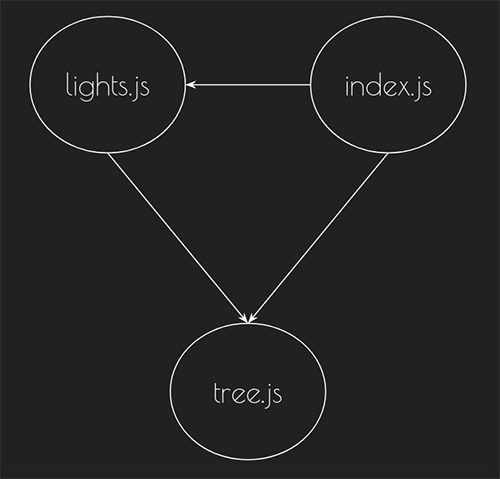
The changed module should have an update handler in every branch of its dependency graph. Currently, we are not accepting the changes for tree.js in index.js and the upcoming hot update is rejected.
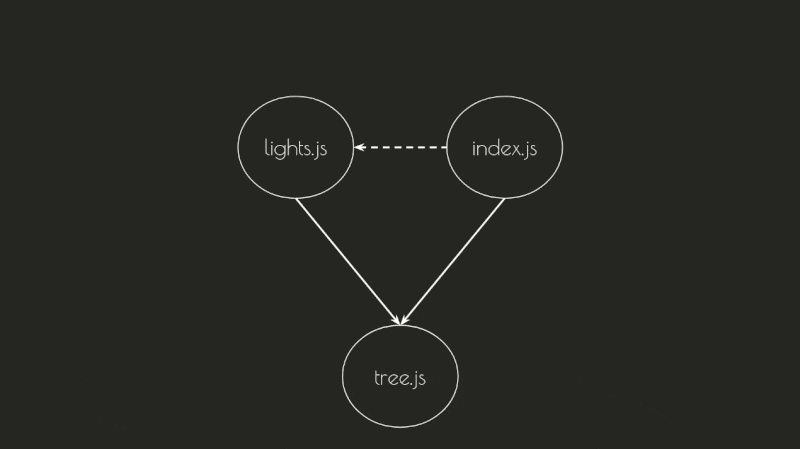
Notice that if we have only one root module, we can add an application-wide update handler in it. We won't do that in our project for now. For example, if you're using Angular your task is a little easier, as most Angular apps have a single entry module -
main.ts, which bootstraps the app. If there are no lazy loaded NgModules, main.ts will be the only root module. Adding the following handler to it will catch all hot updates in the app:
if (module.hot) {
module.hot.accept(["./app/app.module"], function() { ... });
}
import { AppModule } from "./app/app.module";
...
Back on our project again - we need a parent accept for tree.js inside index.js. And we don't even need a callback.
src/index.js
if (module.hot) {
module.hot.accept(['./tree.js']);
}
Now the handler look-up process will be successful, because the hot updates for tree.js are accepted in all of its parents.
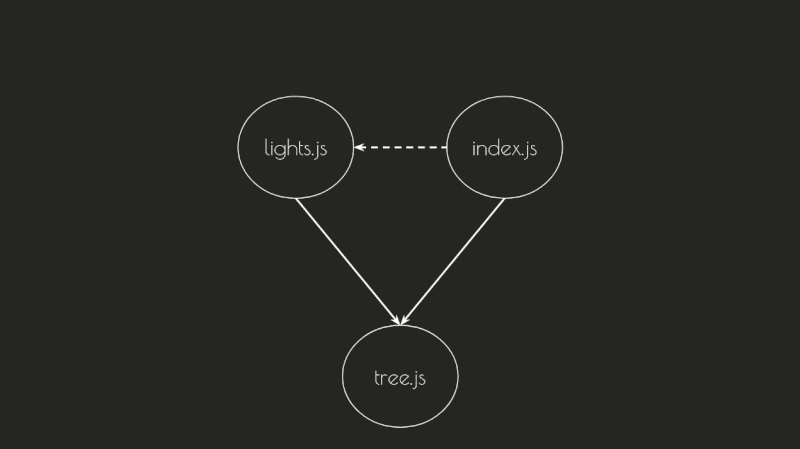
Let's try changing the value of NEEDLE_CLASS one last time before we give up:
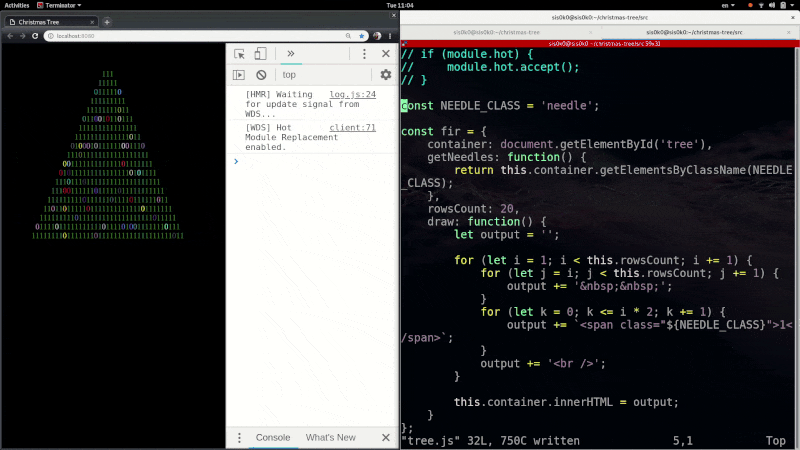
Yeyyy! It works! But...
The code we wrote doesn't really...feel good to me. The parent accept in index.js seems a bit artificial - it's there only because we have to accept the upcoming update. And what if we add a new module that imports tree.js? We will have to add an update handler inside it too! It's time to refactor.
Currently, we need to accept the tree.js changes in index.js and lights.js, because both modules import it.
Let's take a look at how lights.js uses tree.js:
src/lights.js
import fir from './tree.js';
function turnOn() {
const rowsCount = fir.rowsCount;
const needles = fir.getNeedles();
...
}
turnOn();
Instead of importing fir, we can make it a parameter of the turnOn function. In that case, the function shouldn't be called, but exported instead.
src/lights.js
// import fir from './tree.js';
export function turnOn(fir) {
const rowsCount = fir.rowsCount;
const needles = fir.getNeedles();
...
}
// turnOn();
We are not importing tree.js anymore and we can also remove the handler for it:
src/lights.js
if (module.hot) {
// module.hot.accept(['./tree.js'], function() {
// clearInterval(lightsInterval);
// turnOn();
// });
module.hot.accept();
module.hot.dispose(_data => {
clearInterval(lightsInterval);
});
}
Whoever uses lights.js will have to import the turnOn function, call it, and provide the fir object as an argument. In our case the importer is index.js. After doing the necessary modifications, index.js should look like that:
src/index.js
import fir from './tree.js';
import { turnOn } from './lights.js';
turnOn(fir);
if (module.hot) {
module.hot.accept(['./tree.js']);
}
Now, we have an update handler for tree.js only in index.js. We can move the refresh logic for lights.js inside it. Let's export a function that "restarts" the lights:
src/lights.js
export function restart(fir) {
clearInterval(lightsInterval);
turnOn(fir);
}
And call that function from the update handler in index.js:
src/index.js
import fir from './tree.js';
import { turnOn, restart } from './lights.js';
turnOn(fir);
if (module.hot) {
module.hot.accept(['./tree.js'], () => {
restart(fir);
};
}
Let's test out the changes we did by modifying the tree.js file.
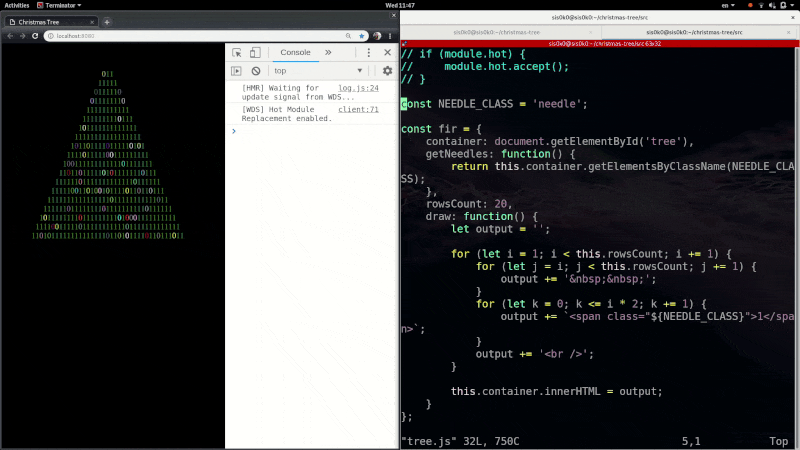
Editing tree.js still works!
However, now the lights.js module is self-accepted and no longer imports tree.js. If we try to modify it, the tree won't be redrawn. We need to move the lights.js update handler to index.js as well.
src/index.js
if (module.hot) {
// add ./lights.js to the list of accepted dependencies
module.hot.accept(['./tree.js', './lights.js'], () => {
restart(fir);
});
}
Don't forget to remove the self accept from lights.js.
src/lights.js
if (module.hot) {
// Comment or remove the line below
// module.hot.accept();
// Keep the disposal logic!
module.hot.dispose(_data => {
clearInterval(lightsInterval);
});
}
That's it! Refactoring done! Let's stop making changes before we break something...
You can find the HMR-charged version of the demo in the branch, called finished: https://github.com/sis0k0/christmas-tree/tree/finished
There is (at least) one bug in the disposal logic of the application. Try to find it! Feel free to open a PR in the Github repo. The first to do it, may (or may not) win something nice 🙂.
We learned how to use the module.hot API to manually handle hot updates. Some frameworks, like React, Vue, Angular, and NativeScript, provide built-in HMR support. In a dedicated article, we will explore how each framework solves the problem of refreshing the application and keeping its state intact.